Before we get to the “right” and what it believes Israel needs most in these trying, often terrifying, turbulent times, we share the video above to give another glimpse from the Israeli street and the efforts of some of the families of the hostages and supporters to make the issue—no longer as front and center as it used to be—a national issue once again. (We’ve added subtitles as needed.)
This video was also created by Or Sitt, the same videographer whose video we featured yesterday. (His Instagram is here)
Readers of this blog/podcast disagree as to what Israel should do, and that’s as it should be in a free-thinking world.
The video is a group of protesters blocking a road. They apologize for the blockage and promise that it won’t be long. They simply ask the drivers who are there to turn off their engines, and to “join” them in the reading of the names of the hostages. The clip doesn’t contain all 115 names, but it gives you the idea.
MONDAY (08/19): Today, as a hostage and cease-fire deal grows, perhaps, closer, the issue of the “deal” (about which we know virtually no details) is becoming ever more politicized. We’re going to devote some time to understanding the general worldviews of “right” and “left” (or “right” and “center” more accurately), and today we present excerpts from a publication distributed by the right that shares with Israelis their plan for Israel. We’ll do the same for the left/center in the near future.
TUESDAY (08/20): The parents of Hersh Goldberg-Polin, Jon and Rachel, have been all over the world advocating for their son. This week, they are at the Democratic National Convention. Several hours before their departure, I met with them to ask them some of the questions our readers have sent about the “deal”, most centrally: “Since we know now that the Gilad Shalit deal was ‘so terrible,’ how would a rational country ‘make the same mistake again?’”
Their responses moved me deeply, and we share them on Tuesday.
WEDNESDAY (08/21): How did being away as a reserve soldier for months on end affect soldiers’ spouses and children? We hear from Gabi Mitchell, whose letter from the front we shared months ago, about what life was like in the days after the 7th, and how his kids have changed and how they’ve remained the same.
THURSDAY (08/22): This week, Rachel Goldberg-Polin was stopped on the street and she gave a man some tzedakah. He gave her a prayer in return. It’s exceptionally beautiful, and she’s permitted us to share it with you.
One of the central purposes of Israel From the Inside is to bring a wide range of Israeli viewpoints to the English speaking audience, and to present each viewpoint as its very best.
A recent conference of right-wing Tkuma movement brought together the leading voices of Israel’s “National Camp”— politicians, army generals, activists, writers, and the times being what they are, the father of a young man held hostage in Gaza— to share their perspective of the Right’s vision.
Following the conference, the movement released a written version of the speeches given, offering a valuable window to the Right’s leading voices as they define their vision for Israel’s future.
Below we bring you a sampling of the speeches—selected to give you a sense of the different themes that were heard: security, the Jewish identity of the State, settlement and sovereignty, and unity.
If you find yourself resonating to their views, great. And if not, what I find helpful when I encounter views that I don’t particularly agree with is to ask myself not “Where are they wrong?” but rather, “What are the strengths of this position that mine do not have?”
Even if that doesn’t change minds, it might start conversations. And that, we need more than ever.
Omer Rachamim, CEO of the Yesha (Judea-Samaria) Council
In the time of the Judicial reform, I found myself sitting in a room where there was an attempt to pull together a number of people to sign a joint statement called the “Israeli agreement.” At the end of the conversation, after all of the nice words about unity, about a democratic and Jewish state …, I requested to see the list of signatories and I asked: “Tell me, does this list include even one Jew who is Sephardi, traditional, Likudnik, from the “Second Israel” [DG - the Mizrahi world]]... you choose the terminology?” And then the truth was revealed.
And do you know what the truth was? They told me, “That's not a population with whom to conduct an intellectual conversation such as this. What interests them? Bread to eat. Clothes to wear.”
I'll tell you what I believe. If the right wants to win, it needs to speak in the name of the millions of Sephardi Jews, the Likud voters, the traditional Jews– this is the sector that if the right wants to win the struggle for the identity of this state– in their name and with their strength we need to speak. For years the left has built bypass mechanisms that circumvent democracy in order to circumvent this traditional population that is the majority. We need to give the majority strength and words.
Nadia Matar, Chairman, The Sovereignty Movement
The Right’s reckoning must go up a notch. We can’t only say “No”-- no to a Palestinian state, and we must not only be satisfied with the critical work of settling Judea and Samaria which was [unfortunately] proven in Gush Katif [DG - the settlements in Gaza, removed in 2005] to be reversible.
It is incumbent upon us to complete the victory of the Six-Day war with a step that the government of Israel has hesitated to take: the application of sovereignty, in law and in action, over the entirety of the Land of Israel. All of this begins, first and foremost, with the deep internalization to the people in the Land of Israel [of the principle] that the Land belongs to us and only to us.
Zvika Mor, the father of Eitan Mor, a captive in Gaza
The Sages asked why was the Temple destroyed? Due to baseless hatred. If you’ll ask historians why it was destroyed, they will tell you it was due to geo-politics. But the Sages didn't come to discuss geo-politics, rather they came to give a message to their generation. In this war, too, there is what is happening “above the surface” and there is what is really happening, “below the surface.” This war, which many describe as a war for our very existence, the second War of Independence of the State of Israel, came, in my humble opinion, in order to afford us an opportunity to clarify three things.
Our attitude to our culture.
Our attitude to our Land.
Our attitude to our nation. Torah, Land and people.
Three things that in past decades have been cracked and chipped away.
The Land has been chipped away in the process that began with (the evacuation of) Yamit [DG – the main settlement in the Sinai that was dismantled so the Sinai could go back to Egypt in 1979] and then continued with the evacuation of Gush Katif [DG - “disengagement” 2005].
The attitude to the nation was cracked by egocentric individualism that is an outcome of Western culture.
And the final issue is the trampling of the holiness of the Jewish people, that came to a head last Yom Kippur [DG- in the battle over separate services in Tel Aviv]. This it seems was the signal to our enemies that it is possible to attack us, that even on the holiest of days, Jews will act in such a way.
It is in these three realms that we must fix. To make a new covenant with the Land. To make a new covenant with our eternity, with our tradition, and the third thing is education in nationalism. The issue of the hostages places us more than ever in the question of the relationship of the whole vs. the individual. The State of Israel’s first responsibility is to its sovereignty, to its nationalism, and from this it comes to its responsibility to its citizens.
Lieutenant Colonel (res.) Itamar Eitam
Hundreds of soldiers from my battalion and tens of thousands of reserve soldiers answered the call to duty and said “We’re ready!”
They didn't answer this call just for a single moment. It was not a passing readiness in the emotion of the moment, but rather a readiness for the long haul, with a steep price, even one that might require the readiness to risk their lives. The strength of our peoplehood that was revealed and continues to be revealed is a tremendous source of power. The willingness to give oneself completely for others who may be completely different from you is the expression of something deep.
My battalion and others are a diverse and complex mosaic of all parts of our society, serving all. Together we will be able to overcome. Together we will be able to rise. Together we will win.
Brigadier-General Dani Van Biran
A nation fighting for its existence must speak in clear terms. We must ask what is our identity and what must we do in order to live here?
The question of identity was answered in the Declaration of Independence. At a time when the concepts were clear and defined: In the Land of Israel the Jewish people was born. In it, its spiritual, religious and national character was formed. We are here because of our Jewish identity, due to our history, religion, and nation.
In order that we will be able to continue on and live here, the IDF must return to being an army that attacks and is decisive, and not an army that contains and deters. These are legitimate and necessary tactics for a people that desires to live in this region.
When we will remember the answer to the question of identity and we will answer with clear foundational ideas, the question of what we must do in order to remain here, we will be able to be a people once again, a free people in our Land.
To understand Israel, one needs to understand that this is a growing movement in Israel. It’s a huge electoral force. It’s not messianic, it includes many people who tend towards the center, but its nationalist and Jewish values are front and center, placed there with great pride and profound faith.
We’ll see an alternative view about how Israel should conduct itself from someone in the left-center in the days to come.




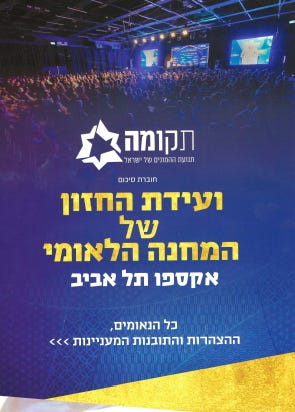

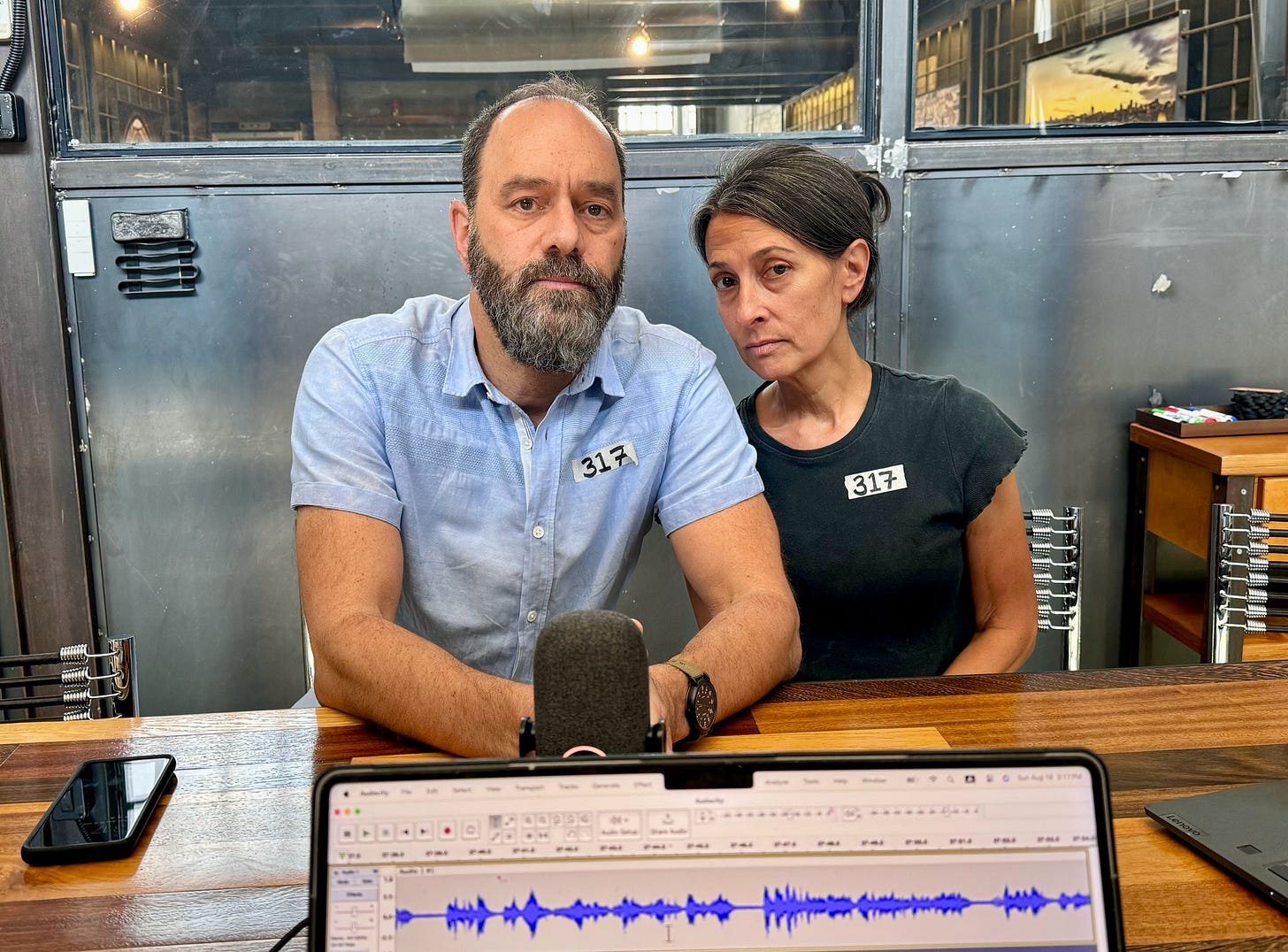

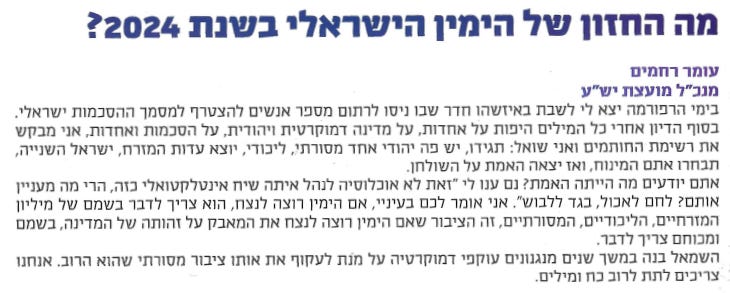

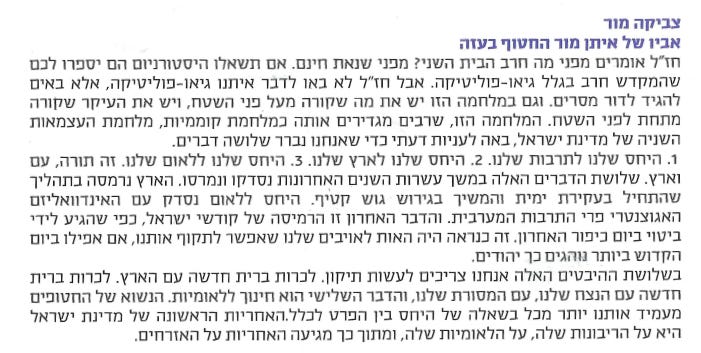

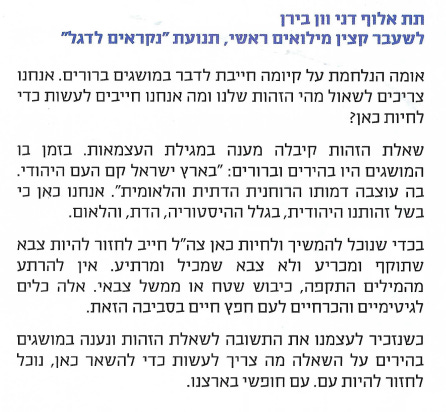
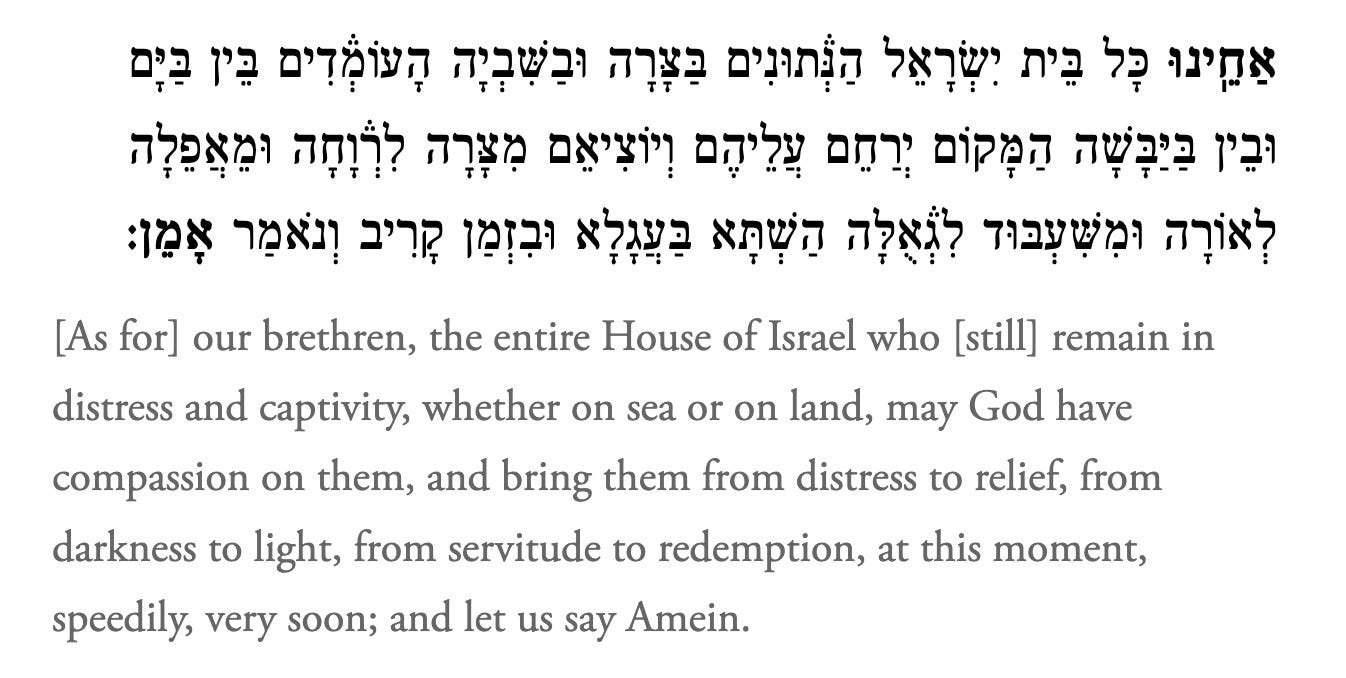












This comment spoke to me as an American because the same thing is happening in my own country: “For years the left has built bypass mechanisms that circumvent democracy in order to circumvent this traditional population that is the majority. We need to give the majority strength and words.” The Left claims to want democracy but thwarting the will of the majority is anything but. The Left also seemingly misunderstands the implacable nature of the enemy. Fortunately, the antisemitism made manifest around the world leave no choice but strength in Eretz Israel.
It's ironic to see this comment coming from a country where there have been long-standing mechanisms imposed ever since its origin to circumvent democracy by favouring traditional rural populations over the urban true majority.